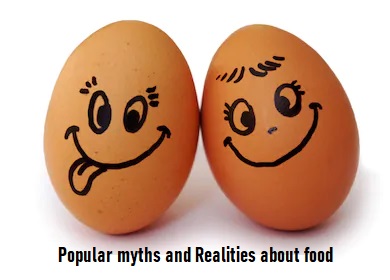In this blog post, you will learn some food myths that aren't true about different foods including myths about milk, myths about fish, myths about eggs, myths about meals, myths about vitamins, and also realities about milk, realities about fish, realities about the egg, realities about the meal, the myth about vitamins. Also, you will learn the health benefits of about mentioned food.
Myths about eating determine the nutritional habits of many people and can have a decisive influence on the way they eat. The myth is often presented as the remnant of a past of ignorance, but erroneous beliefs fostered by a complex world of commercial interests and biased advertising can also be seen. Below you will find clarifications about some myths or erroneous beliefs most common in our community:
Beliefs and realities about Milk And Derivatives:
Beliefs: Some Milk myths that aren't true
"Milk should be taken only by children"
"plain yogurt is better than fruit-flavored yogurt"
"4 cheeseburgers feed like a steak"
Realities: Milk and its derivatives (cheese, yogurts) are almost complete foods, provide very good quality proteins, vitamins A, D, B1, and B2, and must be present daily in the diet of all individuals, since they are the main Calcium source. The amount to take will depend on age and physiological state. A sufficient supply of protein and calcium is especially important in the stages of growth (children and adolescents, pregnant or lactating women). In adults, Proteins are used to "repair" or replace existing structures and are still necessary just like in old age.
From a nutritional point of view, flavored yogurts are the same as natural ones. The difference is especially in the sugar content, which is naturally higher in the flavors than in the natural without sugar and, therefore, the caloric value is also increased. Although the protein content of the cheese can be comparable to that of the fillet, we must not forget that they are foods that belong to different groups and both must be present in the daily diet in certain amounts. Excessive consumption of them can cause problems. Some people may have milk intolerance, but it is advisable to analyze the cause that causes it well before stopping it. Sometimes they can be temporary intolerances and other times they can tolerate other products that substitute milk, such as yogurt.
Beliefs and realities about meals, fish, and eggs
Beliefs: Meal, fish and eggs myths that aren't true
"meat broths are a great food"
"raw eggs feed more"
"red meat is better for health"
"brown eggs are better than white"
" meat should be eaten daily "
" frozen fish is less nutritious than fresh ""
liver and brains are very good for children "
" fish is good for the brain ".
Red meats are not more nutritious than white meats. All meats, whatever animal they come from, provide us with a very similar nutritional value. Meat is not an indispensable food for man, although many people mistakenly believe that it is irreplaceable and that it feeds more than eggs or fish. Not true, the proteins provided by these foods have a similar value. The viscera, like meat, are good sources of protein, and in the case of the liver an excellent source of Iron and also of vitamin A. On the other hand, they have an important contribution of fat and cholesterol. Therefore, they have no advantages over other meats in the child's diet.
Raw egg is digested less than cooked. The white (which has the best quality protein) in the liquid state is only assimilated by 50%; instead, coagulated by the action of heat, it digests by 92%. The dark color of the eggshell does not influence the nutritional value of the eggs. The belief that fish is good because of its phosphorous content has no scientific basis. The nervous tissue is rich in phospholipids, but, as far as is known, the organic development of the brain is not determined by the contribution of phosphorus. Frozen fish, if the cold chain is maintained, has all the nutritional and health benefits of fresh fish.
Beliefs and realities about vegetables, and fruits
Beliefs:
"Legumes cause digestive disorders"
"Potato makes you fat"
"Legumes make you fat"
"The paler parts of vegetables are better"
"Fruits have vitamins on the skin.
Realities: In a healthy person, if the legumes are well cooked, the digestion and absorption of the nutritional substances are almost complete. the digestion of these foods is affected by cooking methods, and the addition of seasonings and fats. To achieve good digestion of legumes, we must follow the following rules:
- Soaking
- Gentle cooking until softened
- Limiting seasonings
like any other food that provides calories, makes you fat if at the end of the day we have eaten more calories than we needed with all the food consumed. However, legumes are an important source of many nutrients and fiber, therefore, they must be present in everyone's diet, at least 2 or 3 times a week. The caloric value of a vegetable dish will depend on the accompaniments and especially on the amount of fat added in the form of oil, butter, bacon, chorizo, etc. Recall that a plate of legumes, accompanied by a small portion of meat or other vegetables, can constitute a complete meal without the need to make another second course. Nutritionally, the most colored parts of vegetables have the highest vitamin content. Contrary to what many people believe, the skin of the fruit provides nothing but fiber. Vitamins are not on the skin. If the fruits are not washed very well, even with a brush, it is much better to peel them, since the skin usually contains traces of chemical substances used to avoid diseases.
Beliefs and Realities about Vitamins
Realities: There are people who believe that the administration of vitamins can cure or avoid all imaginable diseases, make us feel better or even make us live longer. Nothing justifies these beliefs. Vitamins are not food. They are necessary for life, but they only cure diseases caused by their lack. The person who consumes a balanced diet already takes all the vitamins they need and when they are increased it does not produce any beneficial effect. Vitamins are not energy nutrients, that is, they do not provide calories and, therefore, do not fatten. Vitamins have no effects on appetite specials. Vitamins will only correct the effects that have been produced by a lack of them. In malnourished people or those who have to follow very restrictive diet regimens in calories or in some foods, a vitamin-mineral supplement may be indicated, but remember that: No one should adopt the use of large doses of vitamins on their own account, since Although in some of them the excess is eliminated through the urine, in others, especially A and D, they accumulate in the body and can have dangerous effects.
Some food myths that aren't true is discussed above, you should read some other recommended health content given below.






